Top Devops Consulting Firms to Hire in 2025
Discover the best devops consulting firms in 2025. Find expert partners to optimize your DevOps strategies and boost your business success.

Choosing the right DevOps consulting firm is more than just outsourcing tasks; it's about finding a strategic partner to accelerate your software delivery lifecycle, enhance system reliability, and embed a culture of continuous improvement. The market is saturated, making it difficult to distinguish between high-level advisory and hands-on engineering execution. This guide cuts through the noise.
We will provide a technical, actionable breakdown of the top platforms and directories where you can find elite DevOps talent and specialized firms. Instead of generic overviews, we'll dive into the specific engagement models, technical specializations (like Kubernetes orchestration with Helm vs. Kustomize, or Terraform vs. Pulumi for IaC), and vetting processes of each source. A critical part of this evaluation involves understanding how a firm scopes a project. A disciplined approach during initiation, as detailed in this guide to the software development discovery phase, often indicates a partner’s technical maturity and strategic alignment.
This analysis is designed for engineering leaders and CTOs who need to make an informed, data-driven decision to scale their infrastructure and streamline operations effectively. Let's explore the best places to find the devops consulting firms that can architect and implement the robust, scalable systems your business depends on.
1. OpsMoon
OpsMoon stands out as a premier platform for businesses seeking elite DevOps expertise, effectively bridging the gap between strategy and execution. It's designed for organizations that require more than just a standard service provider; it’s for those who need a strategic partner to architect, build, and maintain high-performance, scalable cloud infrastructure. The platform’s core strength lies in its highly vetted network of engineers, granting access to the top 0.7% of global DevOps talent. This rigorous selection process ensures clients are paired with experts possessing deep, practical knowledge of modern cloud-native technologies.
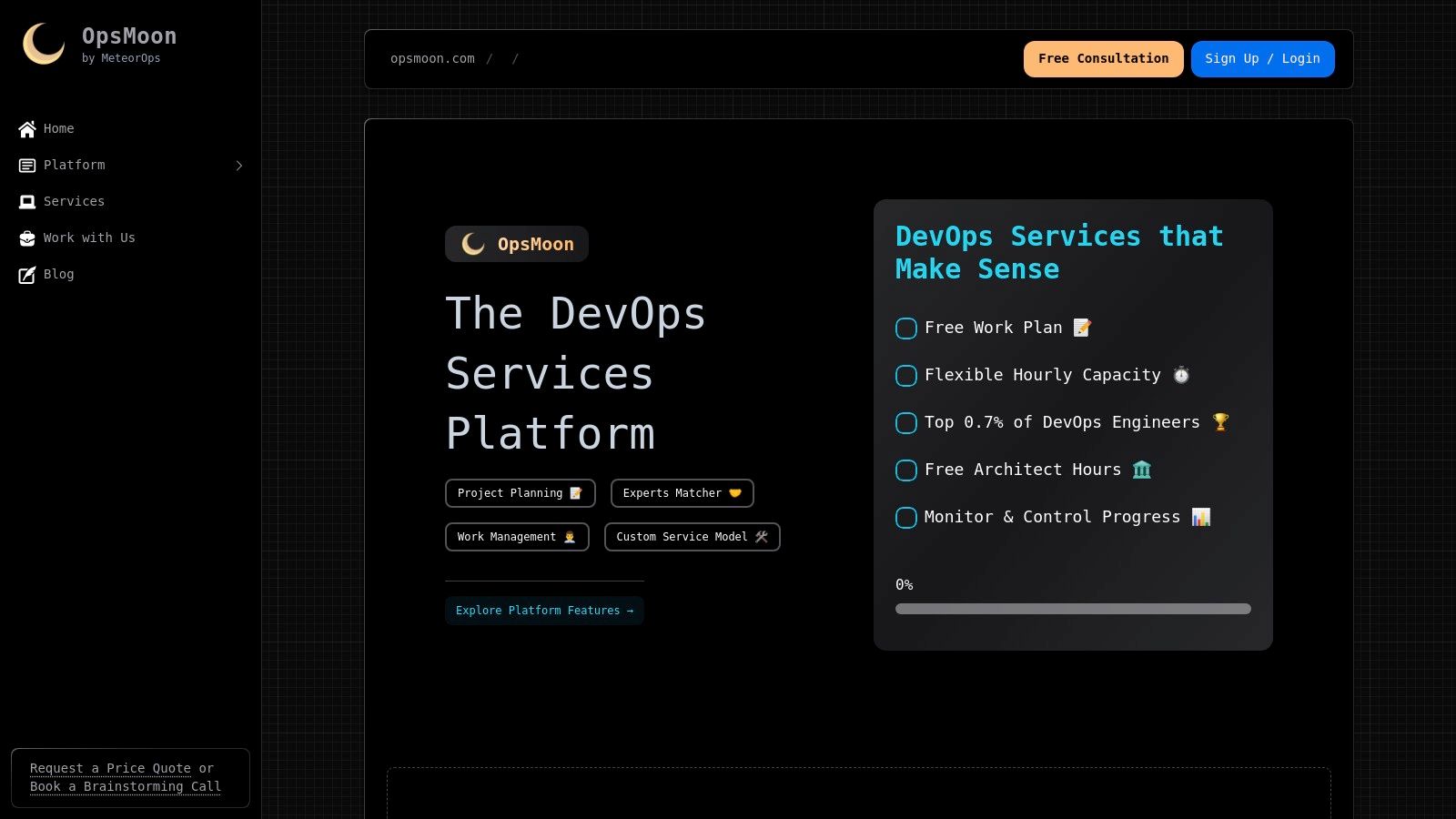
The engagement model begins with a complimentary work planning session, a critical differentiator that sets a solid foundation for success. During this phase, OpsMoon’s senior architects collaborate with your team to perform a DevOps maturity assessment, define precise objectives, and create a actionable roadmap. This initial investment of their expertise at no cost demonstrates a commitment to delivering tangible results from day one.
Key Service Offerings and Technical Strengths
OpsMoon provides a comprehensive suite of services tailored to various stages of the software delivery lifecycle. Their technical proficiency is not just broad but also deep, focusing on the tools and practices that drive modern engineering.
- Kubernetes and Container Orchestration: Beyond basic setup, their experts excel in designing and implementing production-grade Kubernetes clusters with a focus on security, observability, and cost optimization. This includes custom controller development, GitOps implementation with tools like ArgoCD or Flux, and multi-cluster management.
- Infrastructure as Code (IaC): Mastery of Terraform and Terragrunt allows for the creation of modular, reusable, and version-controlled infrastructure. Their engineers implement best practices for state management, secrets handling, and automated IaC pipelines to ensure consistency across environments.
- CI/CD Pipeline Optimization: The focus is on building high-velocity, reliable CI/CD pipelines using Jenkins, GitLab CI, or GitHub Actions. This includes optimizing build times, implementing automated testing gates (unit, integration, E2E), and securing the software supply chain.
- Observability and Monitoring: OpsMoon engineers build comprehensive observability stacks using the Prometheus, Grafana, and Loki (PLG) stack or other solutions like Datadog. This enables proactive issue detection, detailed performance analysis, and robust alerting systems.
What Makes OpsMoon Unique?
OpsMoon distinguishes itself from traditional DevOps consulting firms through its flexible and transparent engagement models. Whether you need a fractional consultant for strategic advisory, an entire team for an end-to-end project, or hourly capacity to augment your existing team, the platform accommodates diverse business needs. This adaptability makes it an ideal choice for fast-growing startups and established enterprises alike.
Another key advantage is the proprietary Experts Matcher technology. This system goes beyond keyword matching to pair projects with engineers based on specific technical challenges, industry experience, and even team dynamics. This ensures a seamless integration and immediate productivity. Coupled with free architect hours and real-time progress monitoring, OpsMoon provides a streamlined and results-oriented consulting experience. For a more detailed comparison, you can explore their analysis of leading DevOps consulting companies on their blog.
Website: https://opsmoon.com
2. Upwork
Upwork offers a unique, marketplace-driven approach to sourcing DevOps expertise, positioning itself as a powerful alternative to traditional devops consulting firms. Rather than engaging with a single, large firm, Upwork provides direct access to a vast, on-demand talent pool of independent DevOps consultants, boutique agencies, and specialized freelancers. This model is ideal for teams needing to scale quickly, fill specific skill gaps, or secure targeted expertise for short-term projects without the overhead of a long-term retainer.
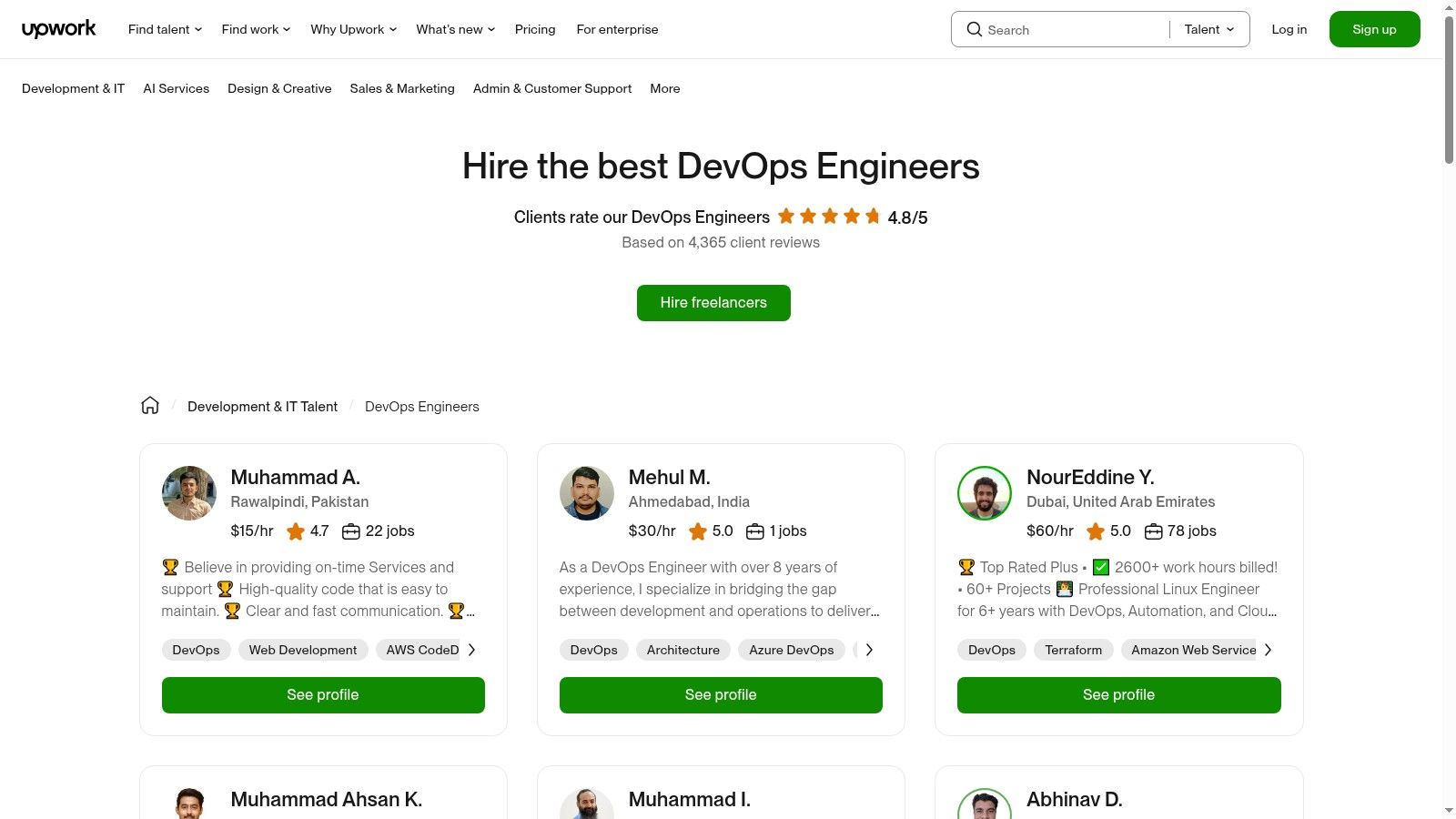
The platform empowers users to post detailed job descriptions outlining specific technical needs, such as implementing a GitOps workflow with Argo CD or optimizing a Kubernetes cluster's cost-performance on EKS. You can then invite pre-vetted talent or browse profiles, filtering by cloud certifications (e.g., AWS Certified DevOps Engineer, Google Cloud Professional Cloud DevOps Engineer), Infrastructure as Code (IaC) tool proficiency like Terraform or Pulumi, and experience with specific CI/CD pipelines.
Key Features and Strengths
The primary strength of Upwork is its speed and flexibility. The time-to-hire can be exceptionally short, often just a few days, compared to the weeks or months required to onboard a traditional consultancy. Its built-in platform handles contracts, time tracking, and secure payments via escrow, simplifying the administrative burden for both parties.
- Extensive Talent Filtering: You can pinpoint consultants with niche skills, from container orchestration with Nomad to observability stack implementation using Prometheus and Grafana.
- Transparent Pricing: Consultants display their hourly rates openly, allowing for clear budget forecasting. This transparency is a significant departure from the often opaque pricing models of larger firms.
- Verified Work History: Each consultant profile includes a detailed work history with client feedback, success scores, and portfolio items, enabling data-driven hiring decisions.
Practical Tips for Hiring on Upwork
To find top-tier DevOps consultants and avoid common pitfalls, it's crucial to be strategic. Define your project scope with precision, including expected deliverables, technology stack, and success metrics. When evaluating candidates, look beyond their stated skills and focus on their project history and client reviews, particularly those from similarly sized companies or complex projects. A useful strategy is to hire a consultant for a small, paid discovery project to assess their technical depth and communication skills before committing to a larger engagement. To help you navigate the process, you can explore detailed guides on how to hire a remote DevOps engineer effectively.
While the platform offers incredible choice, the quality can vary. Vetting candidates for deep architectural expertise versus simple task execution is essential, especially for enterprise-grade projects requiring robust governance and long-term strategic planning.
Website: https://www.upwork.com/hire/devops-engineers/
3. Toptal
Toptal distinguishes itself from other devops consulting firms by offering an exclusive, pre-vetted network of what it calls the "top 3%" of global talent. This model bridges the gap between open marketplaces and traditional consultancies, providing companies with on-demand access to elite, senior-level DevOps engineers and architects. It is particularly well-suited for organizations that require deep, specialized expertise for mission-critical projects like building a secure, multi-tenant Kubernetes platform or executing a large-scale cloud migration with zero downtime.
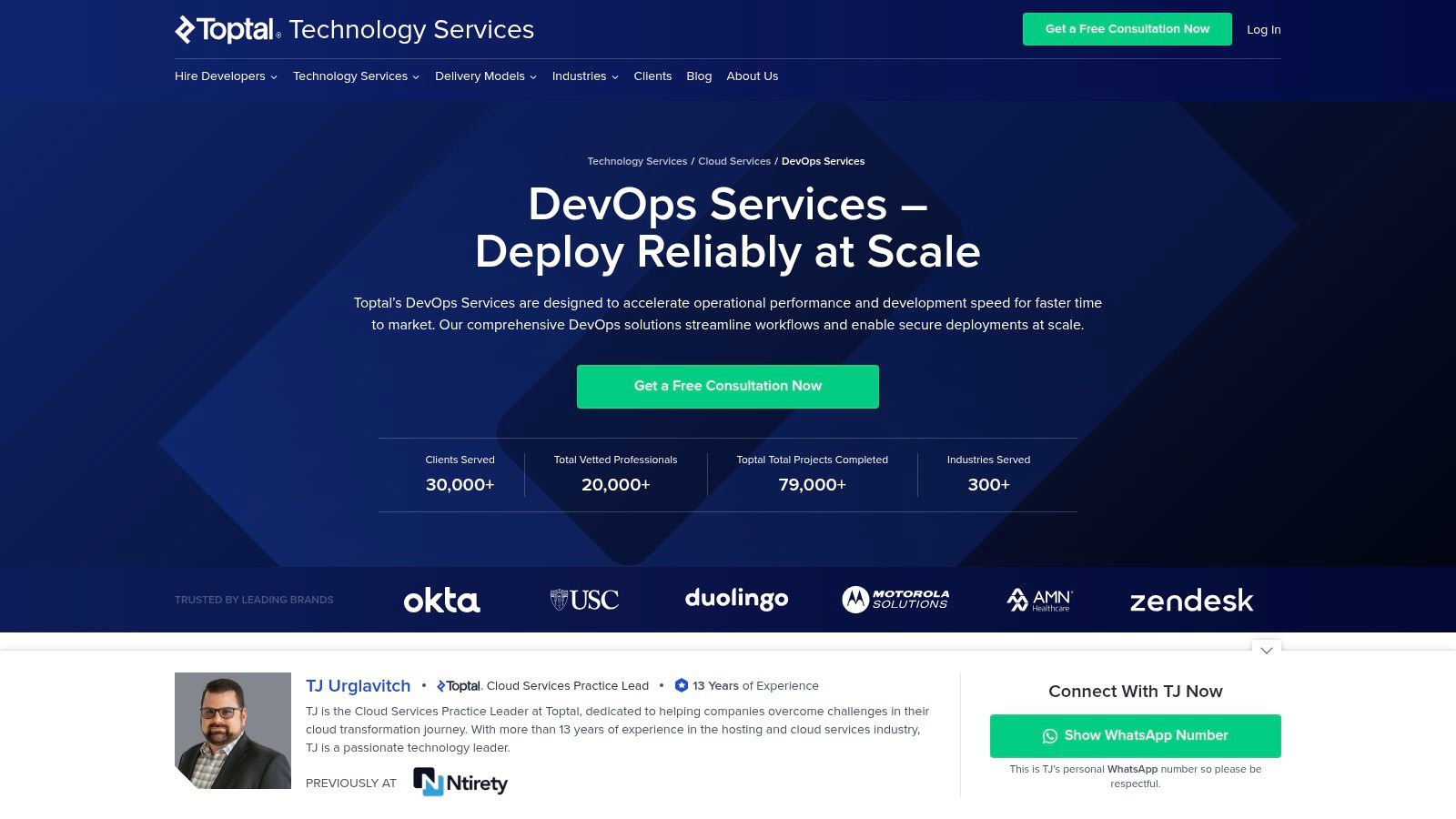
The platform’s core value proposition is its rigorous screening process, which filters candidates for technical prowess, problem-solving skills, and professionalism. This ensures that clients are matched with consultants who can not only execute tasks but also provide strategic guidance, architect robust systems, and lead complex initiatives. You can engage an individual expert for staff augmentation or assemble a fully managed team for end-to-end project delivery, covering areas from DevSecOps integration to advanced infrastructure automation.
Key Features and Strengths
Toptal’s primary strength is its quality-over-quantity approach. The platform’s talent pool consists of seasoned professionals with proven track records in implementing scalable CI/CD pipelines, managing infrastructure with Terraform or Pulumi, and optimizing cloud-native environments on AWS, Azure, and GCP. This high bar significantly reduces the hiring risk and time investment for clients.
- Rigorous Vetting Process: The "Top 3%" claim is backed by a multi-stage screening that tests for deep technical knowledge, communication skills, and real-world project experience.
- Rapid Matching: Toptal typically connects clients with suitable candidates within 48 hours, providing a speed advantage over traditional hiring cycles.
- No-Risk Trial Period: Clients can work with a consultant for a trial period (up to two weeks) and only pay if they are completely satisfied, offering a strong quality guarantee.
Practical Tips for Hiring on Toptal
To maximize value from Toptal, prepare a detailed project brief that outlines not just the technology stack but also the business objectives and key performance indicators (KPIs) for the engagement. For example, instead of asking for "a Kubernetes expert," specify the need for "an SRE with experience in scaling EKS for high-traffic fintech applications, with a focus on cost optimization and SLO implementation." During the matching process, be explicit about the level of strategic input you require. Differentiate between needing an engineer to implement a pre-defined CI/CD pipeline versus an architect to design one from scratch.
While Toptal’s pricing is at a premium compared to open marketplaces, the expertise level often leads to faster project completion and more robust, scalable outcomes. It is less ideal for small, one-off tasks but excels for complex, long-term strategic initiatives where senior-level expertise is non-negotiable.
Website: https://www.toptal.com/services/technology-services/devops-services
4. Clutch
Clutch serves as a comprehensive B2B directory and review platform, offering a structured way to research and shortlist established devops consulting firms. Unlike a direct talent marketplace, Clutch provides a curated ecosystem where businesses can compare verified agencies and system integrators based on detailed profiles, client feedback, and project portfolios. It is particularly effective for organizations looking to engage with a dedicated firm for a strategic, long-term partnership rather than hiring individual contractors for specific tasks.
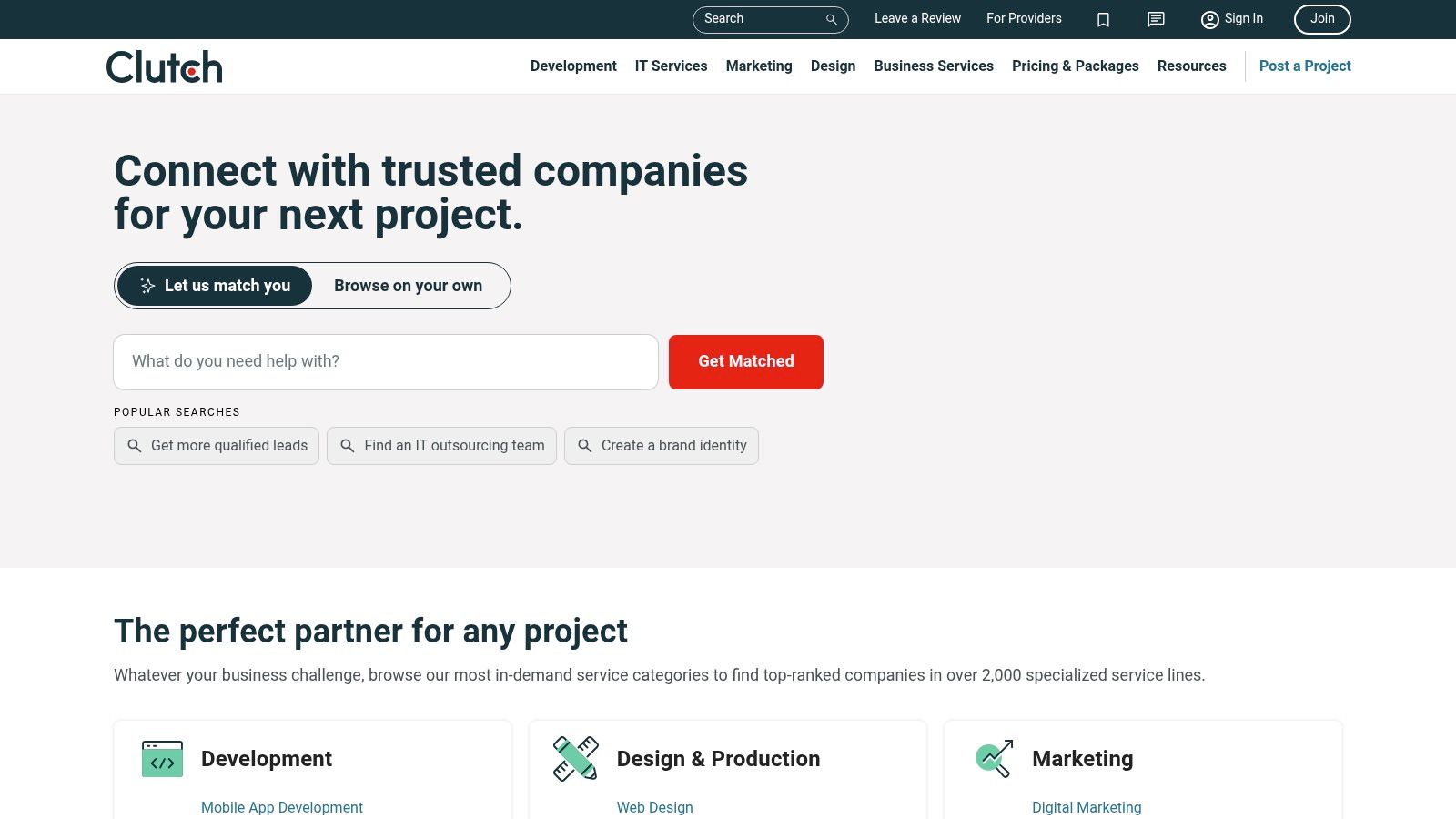
The platform allows you to filter potential partners by location, hourly rate, and minimum project size, making it easier to find a firm that aligns with your budget and scale. Firm profiles often detail their technology focus, such as expertise in AWS, Azure, or GCP, and specific competencies like Kubernetes implementation, CI/CD pipeline automation with Jenkins or GitLab, or security-focused DevSecOps practices. The verified client reviews are its most powerful feature, often including specific details about the project's technical challenges and business outcomes.
Key Features and Strengths
Clutch's main advantage is the depth of its verified information, which helps de-risk the process of selecting a consulting partner. The reviews are often gathered through analyst-led phone interviews, providing qualitative insights that go beyond a simple star rating. This process captures valuable context on project management, technical proficiency, and the overall client experience.
- Detailed Firm Profiles: Each listing provides a comprehensive overview of a firm's service mix, industry focus, and core technical competencies, allowing for precise pre-qualification.
- Verified Client Reviews: In-depth reviews often highlight the specific toolchains used (e.g., Terraform, Ansible, Prometheus) and the tangible results achieved, such as reduced deployment times or improved system reliability.
- Advanced Filtering: Users can efficiently narrow down the list of potential devops consulting firms by budget bands, team size, and specific service lines like Cloud Consulting or IT Managed Services.
- Direct Engagement Tools: The platform includes tools to directly message firms or issue RFP-style inquiries, streamlining the initial outreach and vendor evaluation process.
Practical Tips for Using Clutch
To leverage Clutch effectively, use the filters to create a shortlist of 5-7 firms that match your core requirements. Pay close attention to the reviews from clients of a similar size and industry to your own. Look for case studies that detail projects with a similar technology stack or business challenge, such as a migration from a monolithic architecture to microservices on Kubernetes. While Clutch is an excellent research tool, remember that all scope and pricing negotiations happen off-platform. Be mindful that sponsored placements can affect listing order, so it's wise to evaluate firms based on merit, not just their position on the page.
Website: https://clutch.co/it-services/devops
5. AWS Partner Solutions Finder
For organizations deeply invested in the Amazon Web Services ecosystem, the AWS Partner Solutions Finder is an indispensable directory for sourcing validated devops consulting firms. This platform isn't an open marketplace; instead, it's a curated list of official AWS partners who have earned the prestigious AWS DevOps Competency. This competency badge serves as a rigorous, third-party validation of a firm's technical proficiency and a proven track record of customer success in delivering complex DevOps solutions specifically on AWS.
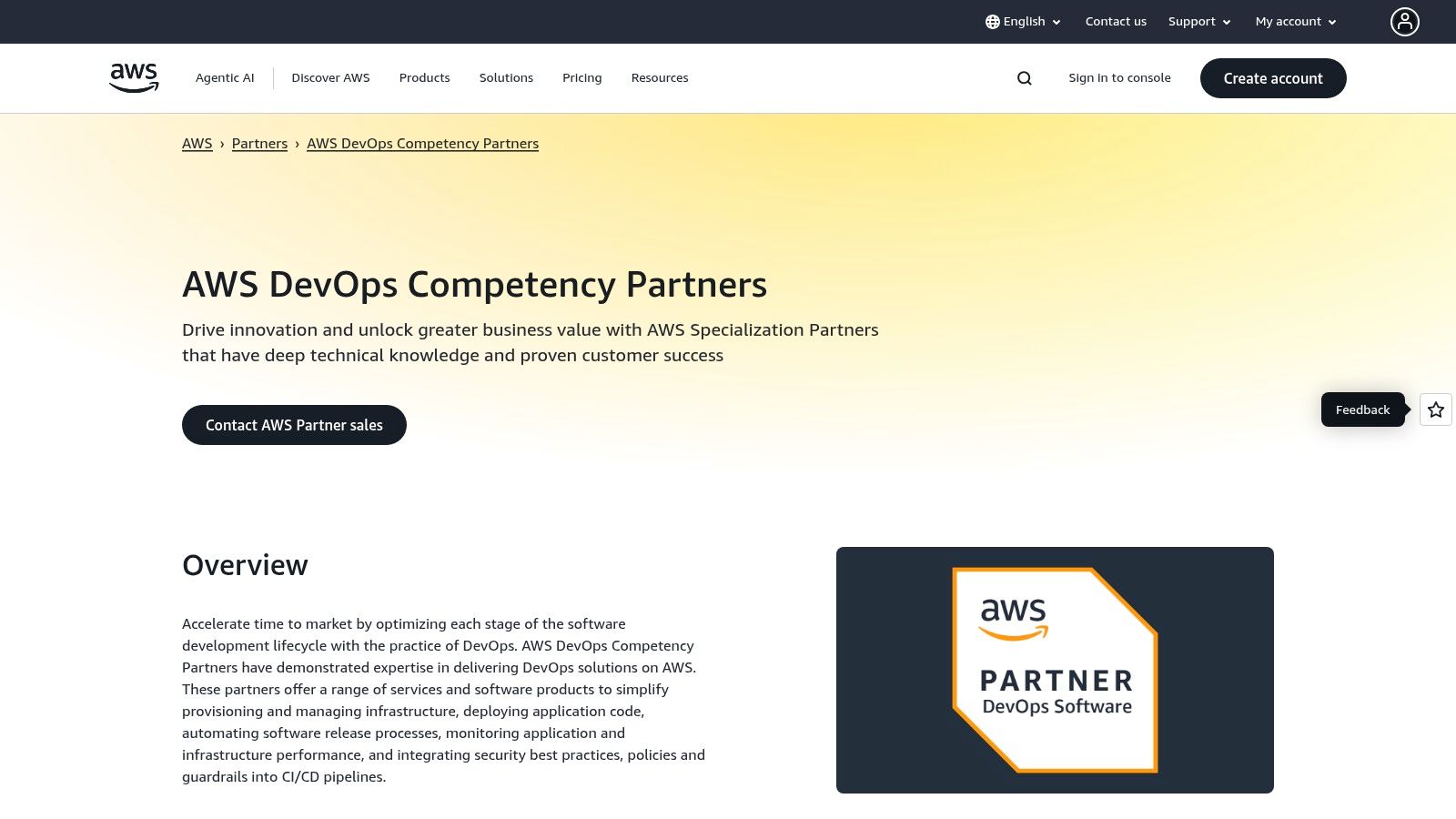
This directory is the go-to resource for businesses looking to build, optimize, or secure their AWS infrastructure using native tooling and best practices. You can directly search for partners with expertise in building CI/CD pipelines with AWS CodePipeline, managing infrastructure with AWS CloudFormation, or implementing observability with Amazon CloudWatch. The platform provides a direct line to firms vetted by AWS itself, removing much of the initial due diligence required when searching in the open market.
Key Features and Strengths
The primary advantage of the AWS Partner Solutions Finder is the inherent trust and quality assurance it provides. The DevOps Competency badge signifies that a partner has passed a stringent technical audit by AWS, ensuring deep expertise in cloud-native automation and governance. This is a critical differentiator for enterprises where compliance and architectural soundness are non-negotiable.
- Validated AWS Expertise: Partners are certified, ensuring they possess a deep understanding of AWS services, from Amazon EKS for container orchestration to AWS Lambda for serverless deployments.
- Specialized DevOps Filters: The platform allows you to filter partners by specific DevOps sub-domains, such as Continuous Integration & Continuous Delivery, Infrastructure as Code, Monitoring & Logging, and DevSecOps.
- Direct Engagement Model: There are no intermediary platform fees for buyers. You find a potential partner and engage with them directly to scope projects and negotiate terms, streamlining the procurement process.
Practical Tips for Hiring via AWS Partner Solutions Finder
To maximize the value of this directory, leverage its specific filters to narrow your search. If your goal is to automate security checks in your deployment pipeline, filter for partners with a DevSecOps focus. Once you've shortlisted a few firms, review their case studies and customer references directly within their AWS partner profile. Pay close attention to projects that mirror your technical stack and business scale.
While the platform is an excellent starting point for any AWS-centric organization, it's important to remember that it is exclusively focused on one cloud provider. For a broader perspective on how different cloud environments stack up, you can explore detailed guides on the key differences between AWS, Azure, and GCP. Finally, since pricing isn't published, be prepared to engage with multiple partners to compare project proposals and cost structures before making a final decision.
Website: https://aws.amazon.com/devops/partner-solutions/
6. Microsoft Azure Marketplace – Consulting Services (DevOps category)
For organizations deeply embedded in the Microsoft ecosystem, the Azure Marketplace offers a streamlined and trusted way to procure DevOps expertise, functioning as a specialized catalog of vetted devops consulting firms and service providers. This platform is not a general freelance marketplace; instead, it lists official Microsoft partners who provide pre-packaged consulting offers specifically for Azure. This approach is ideal for businesses needing to implement or optimize solutions like Azure DevOps pipelines, deploy applications to Azure Kubernetes Service (AKS), or establish robust governance using Azure Policy and landing zones.
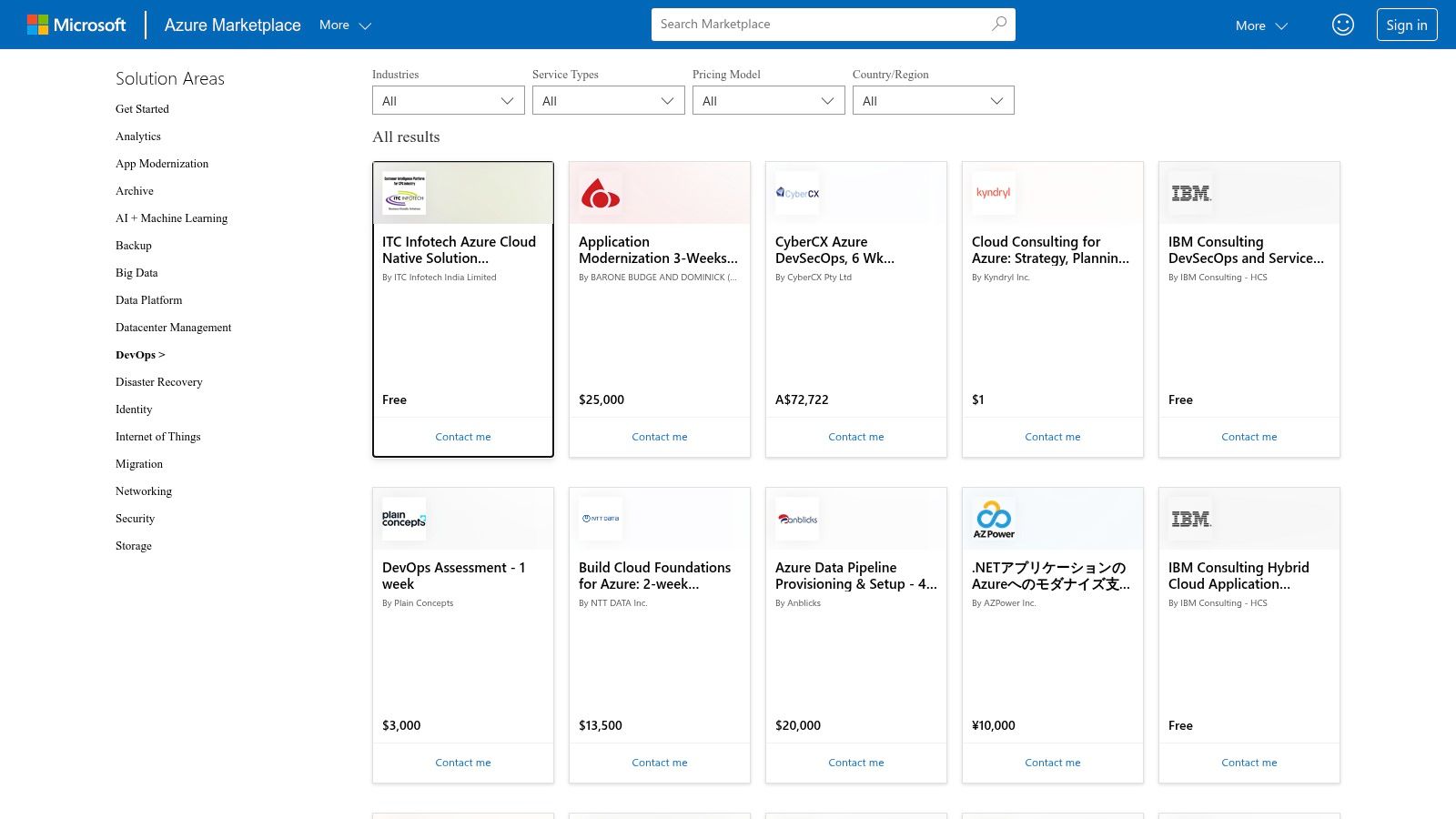
The Marketplace excels at simplifying the procurement process. Instead of lengthy and ambiguous SOWs, partners often list time-boxed engagements, such as a "2-Week AKS Foundation Assessment" or a "4-Week DevSecOps Pipeline Implementation." This model provides clarity on scope, duration, and deliverables, allowing teams to quickly engage experts for specific, high-impact projects. You can browse and filter offers focused on CI/CD with GitHub Actions, Infrastructure as Code (IaC) using Bicep or Terraform, and cloud-native observability.
Key Features and Strengths
The primary advantage of the Azure Marketplace is the guaranteed alignment with Microsoft's best practices and technologies. Every listed partner has been vetted by Microsoft, which significantly reduces the risk associated with finding qualified consultants for complex Azure environments. The platform acts as a direct bridge to certified professionals who have demonstrated expertise within the Azure ecosystem.
- Pre-Defined Service Packages: Many offerings are structured as fixed-duration workshops, assessments, or proof-of-concept implementations, making it easy to budget and plan.
- Simplified Procurement: The platform facilitates direct contact with partners to get proposals and schedule engagements, often integrating with existing Azure billing and account management.
- Azure-Native Expertise: Consultants found here specialize in Azure-specific services, from Azure Arc for hybrid cloud management to implementing security controls with Microsoft Defender for Cloud.
- Vetted Microsoft Partners: The listings feature established consulting firms with proven track records in delivering Azure solutions, providing a higher level of assurance than open marketplaces.
Practical Tips for Using the Azure Marketplace
To leverage the marketplace effectively, start by clearly defining your technical challenge. Are you migrating an existing CI/CD server to Azure DevOps, or do you need help designing a secure multi-tenant AKS cluster? Use specific keywords like "AKS," "GitHub Actions," or "Terraform on Azure" in your search. While many listings don't publish fixed prices, they provide detailed scopes; use the "Contact me" feature to request a precise quote based on your specific requirements. This approach is best for companies committed to Azure, as the expertise is highly specialized and may not be suitable for multi-cloud or hybrid environments involving AWS or GCP.
Website: https://azuremarketplace.microsoft.com/en-us/marketplace/consulting-services/category/devops
7. Google Cloud Partner Advantage
For organizations deeply invested in the Google Cloud Platform ecosystem, the Google Cloud Partner Advantage directory is an indispensable resource for finding highly vetted devops consulting firms. Rather than a general marketplace, this platform serves as Google’s official, curated list of certified partners who have demonstrated profound expertise and customer success specifically within the GCP environment. This makes it the most reliable starting point for teams seeking to implement or optimize solutions using Google-native tools like Cloud Build, Artifact Registry, Google Kubernetes Engine (GKE), and Cloud Operations Suite.
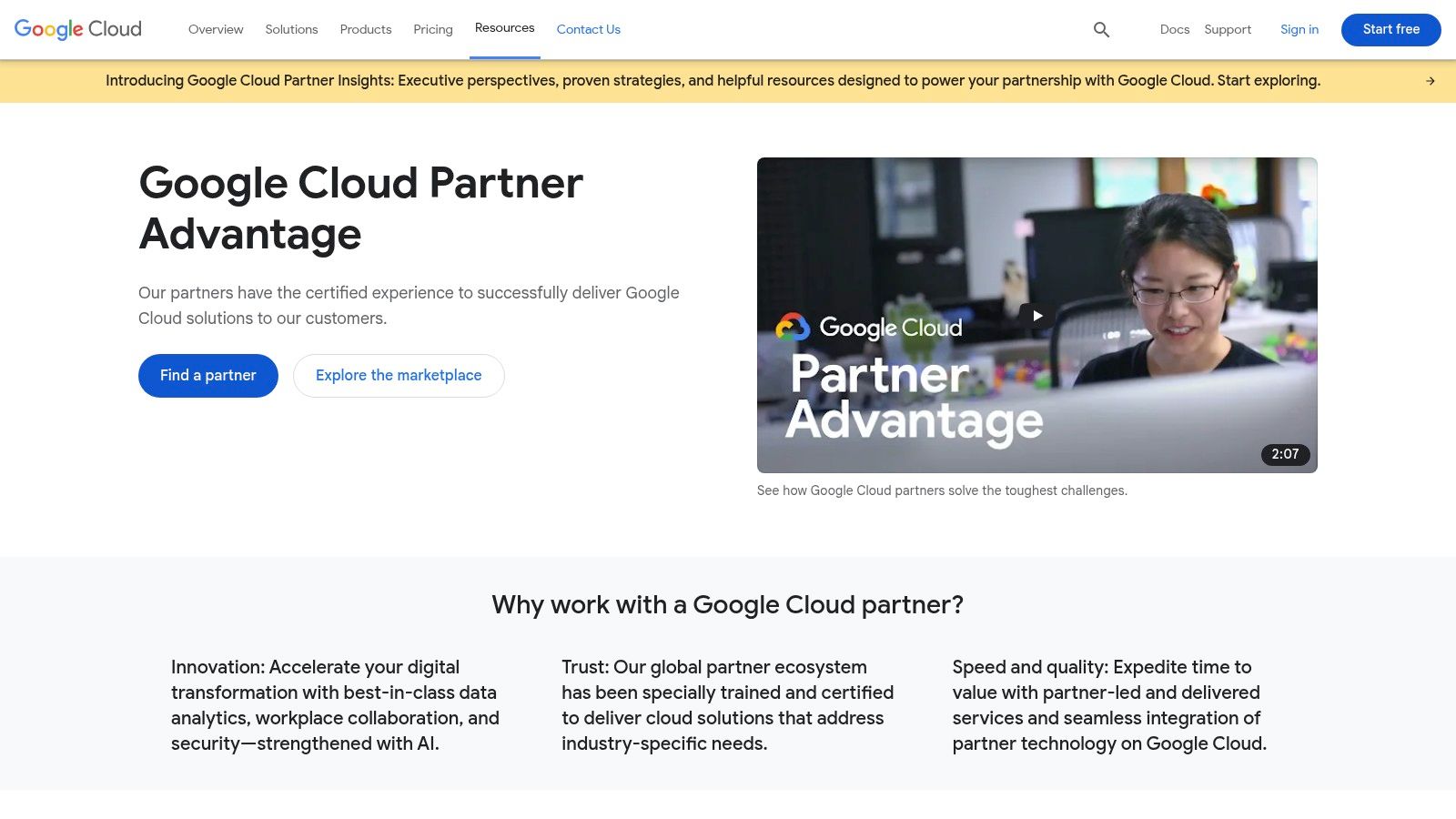
The directory allows you to find partners who have earned specific "Specialization" badges, which act as a rigorous validation of their capabilities. For DevOps, this means a partner has proven their ability to help customers build and manage cloud-native applications using CI/CD pipelines, containerization, and Site Reliability Engineering (SRE) principles aligned with Google's best practices. You can filter partners by these specializations, industry focus, and geographical region to create a targeted shortlist.
Key Features and Strengths
The primary advantage of using this directory is the high level of trust and assurance it provides. Every partner listed has undergone a stringent vetting process by Google, significantly reducing the risk of engaging an underqualified firm. This is particularly critical for complex projects involving GKE fleet management, Anthos configurations, or implementing advanced observability with Cloud Monitoring and Logging.
- Validated GCP Expertise: Specialization badges in areas like "Application Development – Services" and "Cloud Native Application Development" confirm a partner’s technical proficiency and successful project history.
- Targeted Search Capabilities: Users can efficiently filter for consultants with experience in specific industries like finance or healthcare, ensuring they understand relevant compliance and security requirements.
- Aligned with Google Best Practices: Partners are experts in applying Google's own SRE and DevOps methodologies, ensuring your infrastructure is built for scalability, reliability, and security from day one.
- No Directory Fees: Accessing the directory and connecting with partners is free for potential clients; engagement costs are negotiated directly with the chosen consulting firm.
Practical Tips for Using the Directory
To maximize the value of the Partner Advantage directory, start by clearly defining your technical objectives. Are you looking to migrate a monolithic application to microservices on GKE, or do you need to establish a secure CI/CD pipeline for a serverless application using Cloud Functions and Cloud Run? Use specific keywords like "Terraform on GCP" or "GKE security" in your initial search. When evaluating potential partners, look for case studies on their profiles that mirror your own challenges. Since pricing is not listed, you will need to request proposals; be prepared with a detailed scope of work to receive accurate quotes. The platform is inherently GCP-centric, making it less suitable for organizations operating in multi-cloud or standardized AWS/Azure environments.
Website: https://cloud.google.com/partners
Top 7 DevOps Consulting Firms Comparison
| Service/Platform | Implementation Complexity | Resource Requirements | Expected Outcomes | Ideal Use Cases | Key Advantages |
|---|---|---|---|---|---|
| OpsMoon | Medium to High | Access to top 0.7% remote DevOps engineers; requires remote collaboration readiness | Accelerated projects, improved release velocity, scalable cloud infrastructure | Startups, SMEs, large enterprises needing tailored DevOps support | High-quality talent, free planning/architect hours, flexible engagement, continuous progress tracking |
| Upwork | Low to Medium | Large freelancer pool; self-managed hiring and screening | Quick hires, access to wide expertise | Short-term or varied DevOps tasks, quick talent acquisition | Fast hiring, broad expertise, transparent profiles and pricing |
| Toptal | Medium | Pre-vetted senior DevOps consultants; premium pricing | High-quality, low-risk senior expertise | Senior-level DevOps projects, managed delivery, specialized cloud services | Rigorous vetting, fast matching, strong cloud and DevOps breadth |
| Clutch | Low | Research and shortlisting tool; direct vendor negotiation | Well-informed vendor selection | Researching and selecting established DevOps consulting firms | Verified reviews, detailed firm profiles, budget filters |
| AWS Partner Solutions Finder | Medium | AWS certified partners specializing in DevOps | Trusted AWS-aligned DevOps solutions | AWS-centric organizations seeking certified partners | AWS competency badge, no buyer fees, focused AWS expertise |
| Microsoft Azure Marketplace – Consulting Services | Low to Medium | Azure partner consulting offers in time-boxed packages | Simplified procurement, Azure-aligned DevOps | Azure-centric DevOps projects needing fixed-duration services | Azure-standard aligned, packaged offerings, direct partner contacts |
| Google Cloud Partner Advantage | Medium | Certified GCP consulting partners | Trusted GCP-native DevOps solutions | GCP-focused teams needing verified DevOps consultants | Google-certified partners, no directory fees, specialized GCP expertise |
Making Your Final Decision: The Technical and Strategic Checklist
Navigating the landscape of DevOps consulting firms is a critical step toward modernizing your engineering practices. As we've explored, platforms range from broad marketplaces like Upwork and Toptal to highly specialized, pre-vetted talent pools like OpsMoon and vendor-specific ecosystems such as the AWS Partner Solutions Finder. Your final choice depends less on finding a "best" firm and more on identifying the right partner for your unique technical and business context. The key is to move beyond surface-level comparisons and apply a rigorous, multi-faceted evaluation framework.
The Actionable Evaluation Scorecard
To transition from a list of potential partners to a confident decision, create a technical and strategic scorecard. This internal document will force you to quantify what truly matters for your project's success. Rate each candidate firm or platform on a scale of 1-5 across these core pillars:
- Technical Stack Alignment: Do they have demonstrable, hands-on experience with your specific cloud provider, container orchestration (e.g., Kubernetes, Nomad), and IaC tools (e.g., Terraform, Pulumi)? Ask for case studies or architectural diagrams from past projects that mirror your environment.
- CI/CD Maturity: Assess their expertise in building and optimizing robust delivery pipelines. When assessing a firm's technical acumen, delve into their understanding of continuous integration best practices, a cornerstone of successful DevOps implementations. A proficient partner should be able to discuss advanced strategies like pipeline-as-code, artifact management, and security scanning within the CI/CD lifecycle.
- Engagement Model Flexibility: Can they adapt to your needs? Evaluate their ability to offer everything from a short-term, high-impact SRE audit to a long-term, embedded team model for a greenfield platform build.
- Knowledge Transfer and Documentation: A great consultant works to make themselves obsolete. How do they plan to document infrastructure, processes, and runbooks? Clarify their approach to upskilling your internal team to ensure long-term self-sufficiency.
Beyond the Scorecard: The Intangibles
While a scorecard provides objective data, don't discount the qualitative factors. A successful partnership with a DevOps consulting firm hinges on cultural and philosophical alignment. Consider their communication style: Do they favor asynchronous communication via detailed pull requests and documentation, or do they rely on synchronous meetings?
Furthermore, probe their tooling philosophy. Are they dogmatic about a specific set of proprietary tools, or do they advocate for the best tool for the job, whether open-source (like Prometheus/Grafana) or commercial? This reveals their adaptability and commitment to your success over their own pre-existing partnerships. Platforms that offer a preliminary planning session, like OpsMoon, provide a crucial, low-risk opportunity to assess this cultural fit and technical approach before you commit significant resources. By balancing rigorous technical vetting with this strategic assessment, you position yourself to not just hire a contractor, but to forge a partnership that accelerates your journey toward engineering excellence.
Ready to find a DevOps partner who aligns with your technical roadmap and business goals? OpsMoon connects you with elite, pre-vetted DevOps and SRE experts for projects of any scale. Start with a free, no-obligation work planning session to build a concrete project plan with a top-tier consultant today. Get started with OpsMoon.
